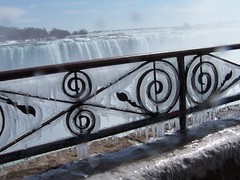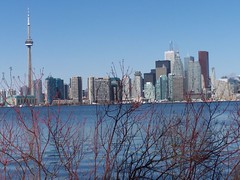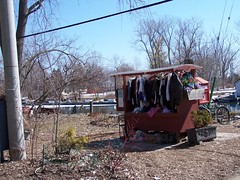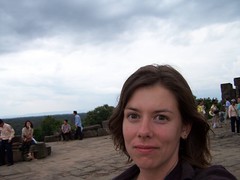Ha pedig valakinek közületek nincsen bölcsessége, kérje Istentől, a ki mindenkinek készségesen és szemrehányás nélkül adja; és megadatik Néki. De kérje hittel, semmit sem kételkedvén: mert a ki kételkedik, hasonlatos a tenger habjához, a melyet a szél hajt és ide s tova hány. Jakab 1. 5-6.
But if any of you lacks wisdom, let him ask of God, who gives to all generously and without reproach, and it will be given to him. But he must ask in faith without any doubting, for the one who doubts is like the surf of the sea, driven and tossed by the wind. James 1. 5-6.
2008. április 19., szombat
2008. április 17., csütörtök
The method at McGill is much more practical than at Budapest Corvinus University. Sometimes we also have guest speakers in Budapest, but not as many and not as colourful and fun people like here, at McGill. I recognised that people use less humour in teaching, business, everyday actions in Hungary. Somehow they consider themselves more serious which is silly because their expertise depends on their knowledge not on their behaviour, motion or outfit. I guess, it is in contact with self-confidence. If we imagine two people with the same level of knowledge, one has self-confidence so s/he is free to make jokes and feel him/herself comfortable and relaxed, the other without self-confidence feels him/herself insecure and frustrated, needs to hide feelings.
The system McGill offers, teach students to learn how to feel secure and self-confident which is at some point more important than knowledge and theory. In contact with the previous, I find it very good that students have to handle in many types of writings like interview, book critics, and reflection; there is also team work and presentation. Everybody have strengths and weaknesses. Maybe one is stronger in research and weaker in presentation. With this method weaknesses are compensable with strengths and finally everybody is good enough. I have the feeling it is more difficult to fail here, because the whole environment is supportive and helpful. This method I understood here was very inspiring!
Concerning previous studies my main field is organizational development. For me development is important because it let us compare past, present and future. I like to do reflection. It helps personal development. Sometimes I understand happenings during reflection or discussion. This is part of the practical method which is more and more used also in Hungary.
Still somehow I feel that the practical method grow here naturally. In Hungary we use it as an imported knowledge. We do presentations, teamwork; try to be practical but the whole thing is not that natural yet. Maybe just need time! The problem is that old fashioned, not working solutions are still there too, and they are mixing with new, practical methods. Finally the outcome is a hybrid mixture, better than the previous one but still far from the final goal. Teachers do their best but they can not change their mentality quickly. It is very slow process.
Do not misunderstand me! I do not believe that we should do a complete change and import the western knowledge as it is! No! There are some good solutions within our culture. I think we are strong in philosophical thinking, theoretical coherences, and analysis. We have to keep those; the process should be done well balanced, and we should grow naturally in the new solutions instead of pushing.
Our life is an opportunity. We received it to understand procedures and develop ourselves and our environment in certain aspects. Globalization gives us a broad frame to follow personal, local, regional, national and international development. What does globalization mean for me? I like the holistic explanation about globalization that in economical, political, environmental and social spheres it means the same: an approach, viewing procedures from supranational point of view. Travelling is one of the positive effects of globalization: our world is shrinking. I enjoy thinking and discussing issues with people from different places and cultures. It gives me liberality (széles látókör). How other way could I develop my concepts if not challenging and keep changing them?
At McGill we often had guest speakers. Often oppositions. The opportunity was given to decide who to trust, what to believe, who to support. It definitely took longer, because the same topic was mentioned two or more times but of course from different aspects! It was time consuming, but worthy because students had to challenge themselves and that gave responsibility. Little group discussions gave an opportunity to interpret the heard. And interpreting the knowledge sticked it in deeper layers of the brain.
I am happy to come and have McGill experience with 6 years of work experience before at Kodak. Everything is so well planned in our life. I have seen things with different eyes! Please read also Henry Mintzberg.
Article
The system McGill offers, teach students to learn how to feel secure and self-confident which is at some point more important than knowledge and theory. In contact with the previous, I find it very good that students have to handle in many types of writings like interview, book critics, and reflection; there is also team work and presentation. Everybody have strengths and weaknesses. Maybe one is stronger in research and weaker in presentation. With this method weaknesses are compensable with strengths and finally everybody is good enough. I have the feeling it is more difficult to fail here, because the whole environment is supportive and helpful. This method I understood here was very inspiring!
Concerning previous studies my main field is organizational development. For me development is important because it let us compare past, present and future. I like to do reflection. It helps personal development. Sometimes I understand happenings during reflection or discussion. This is part of the practical method which is more and more used also in Hungary.
Still somehow I feel that the practical method grow here naturally. In Hungary we use it as an imported knowledge. We do presentations, teamwork; try to be practical but the whole thing is not that natural yet. Maybe just need time! The problem is that old fashioned, not working solutions are still there too, and they are mixing with new, practical methods. Finally the outcome is a hybrid mixture, better than the previous one but still far from the final goal. Teachers do their best but they can not change their mentality quickly. It is very slow process.
Do not misunderstand me! I do not believe that we should do a complete change and import the western knowledge as it is! No! There are some good solutions within our culture. I think we are strong in philosophical thinking, theoretical coherences, and analysis. We have to keep those; the process should be done well balanced, and we should grow naturally in the new solutions instead of pushing.
Our life is an opportunity. We received it to understand procedures and develop ourselves and our environment in certain aspects. Globalization gives us a broad frame to follow personal, local, regional, national and international development. What does globalization mean for me? I like the holistic explanation about globalization that in economical, political, environmental and social spheres it means the same: an approach, viewing procedures from supranational point of view. Travelling is one of the positive effects of globalization: our world is shrinking. I enjoy thinking and discussing issues with people from different places and cultures. It gives me liberality (széles látókör). How other way could I develop my concepts if not challenging and keep changing them?
At McGill we often had guest speakers. Often oppositions. The opportunity was given to decide who to trust, what to believe, who to support. It definitely took longer, because the same topic was mentioned two or more times but of course from different aspects! It was time consuming, but worthy because students had to challenge themselves and that gave responsibility. Little group discussions gave an opportunity to interpret the heard. And interpreting the knowledge sticked it in deeper layers of the brain.
I am happy to come and have McGill experience with 6 years of work experience before at Kodak. Everything is so well planned in our life. I have seen things with different eyes! Please read also Henry Mintzberg.
Article
Labels:
globalization,
method,
practical,
self-confidence
2008. április 16., szerda
Miről mesél a cipőtisztítás?
Az alábbi cikk érdekes. Fejlett és fejlődő országok cipőtisztítási szolgálatai alapján vonja le a szerző a következtetést :-)
Érdemes átfutni!
Article
Én is lefoglalom magam a szakdolgozati témakörömmel.
A globalizáció hatása: nyugati, északi, fejlett országokban jól bevált megoldások, módszerek exportja és azok hatása a kevésbé fejlett keleten és délen.
A kikölcsönzött könyvhegy itt tornyosul a hátam mögött... még másfél hetem van. Elszaladt 4 hónap. Hálás vagyok érte. Vágyom találkozni Veletek, de maradnék is még! Nem baj, azt hiszem jól van ez így! Varázslat volt ez az időszak!
A vasárnapot Emesével töltöttem, aki misszionárius volt. Sri Lankán és Kenyában szolgált 20 éven keresztül. Mindig tudta, hogy mit kell tennie, akármilyen nehéz körülmények közé került.
Most örül, hogy végre sok-sok ideje van a barátaira és a közösségre. Piros mézeskalácsházban lakik Montreál északi részén, a mókusokra hargszik, mert megrágják a magnóliát. Csodálatos a rebarbarasüteménye. Az életéből könyvet lehetne írni. Szoros kapcsolata volt és van Istennel, engedte, hogy a Szentlélek az Őt érzékelő szervét megnyissa.
Érdemes átfutni!
Article
Én is lefoglalom magam a szakdolgozati témakörömmel.
A globalizáció hatása: nyugati, északi, fejlett országokban jól bevált megoldások, módszerek exportja és azok hatása a kevésbé fejlett keleten és délen.
A kikölcsönzött könyvhegy itt tornyosul a hátam mögött... még másfél hetem van. Elszaladt 4 hónap. Hálás vagyok érte. Vágyom találkozni Veletek, de maradnék is még! Nem baj, azt hiszem jól van ez így! Varázslat volt ez az időszak!
A vasárnapot Emesével töltöttem, aki misszionárius volt. Sri Lankán és Kenyában szolgált 20 éven keresztül. Mindig tudta, hogy mit kell tennie, akármilyen nehéz körülmények közé került.
Most örül, hogy végre sok-sok ideje van a barátaira és a közösségre. Piros mézeskalácsházban lakik Montreál északi részén, a mókusokra hargszik, mert megrágják a magnóliát. Csodálatos a rebarbarasüteménye. Az életéből könyvet lehetne írni. Szoros kapcsolata volt és van Istennel, engedte, hogy a Szentlélek az Őt érzékelő szervét megnyissa.
2008. április 12., szombat
Henry Mintzberg PhD '68 - "Research is about enabling people to understand the world better."
Henry Mintzberg is a Cleghorn Professor at McGill University, Management Faculty.
He was always been as somewhat of a rebel. That is why MIT (Massachusets Institute of Technology) in Boston was a perfect place for him. Also Thomas Kuhn spent his time here from 1979 - 1991.
When Mintzberg was working on his PhD in the field of policy which means strategy today, only a single professor called Ned Bowman had such an interest at MIT. He allowed Mintzberg to construct his own reading list and gave him free reign over his research. It was exactly that tolerance, this willingness to experiment, says Mintzberg, that allowed his thesis to be as successful as it was. (MIT Sloan, Winter 2008)
His book, Managers not MBAs changed the way many people thought about education managers. At McGill University, where he had been teaching since he left MIT, he was instrumental in designing the International Masters in Practicing Management, a program which enables practicing managers to learn from their own experience throught a series of international modules (www.impm.org)
Dr. Mintzberg frequently teaches at Indian institutions, B-schools in Bangalore and sais "...don't create managers there... create hubris. Students are too young, the curriculum is too analytical. Indian institutes create very good consultants and financial analysts but no managers!" Another disturbing trend these days is "the overkill on leadership". So what should the B-schools do right the wrongs? "Only teach management to managers. Focus education on those learning from their own experience". (Hindustan Times, 04th February 2008)
Article

And now Henry Mintzberg is focusing on health issues. Created a program that lies on the co-work of international health professionals from around the world. It is not a leadership training. They focus on their common development based on their own experiences. The International Master for Health Leadership at McGill University is a programme designed to help health professionals and others manage in the complex health environment using Henry Mintzberg’s five mindsets approach:
Reflective Mindset – Broadening Perspectives
Analytic Mindset – Leading Organizations
The Worldly Mindset – Navigating the System
The Collaborative Mindset – Appreciating Work Relationships
The Catalytic Mindset – Achieving Change
“We are setting out to change not only education for health leadership but the health system itself by bringing into an ongoing forum the best of practising leadership from all aspect of health and from all regions of the world.”
Dr. Henry Mintzberg
Article
He was always been as somewhat of a rebel. That is why MIT (Massachusets Institute of Technology) in Boston was a perfect place for him. Also Thomas Kuhn spent his time here from 1979 - 1991.
When Mintzberg was working on his PhD in the field of policy which means strategy today, only a single professor called Ned Bowman had such an interest at MIT. He allowed Mintzberg to construct his own reading list and gave him free reign over his research. It was exactly that tolerance, this willingness to experiment, says Mintzberg, that allowed his thesis to be as successful as it was. (MIT Sloan, Winter 2008)
His book, Managers not MBAs changed the way many people thought about education managers. At McGill University, where he had been teaching since he left MIT, he was instrumental in designing the International Masters in Practicing Management, a program which enables practicing managers to learn from their own experience throught a series of international modules (www.impm.org)
Dr. Mintzberg frequently teaches at Indian institutions, B-schools in Bangalore and sais "...don't create managers there... create hubris. Students are too young, the curriculum is too analytical. Indian institutes create very good consultants and financial analysts but no managers!" Another disturbing trend these days is "the overkill on leadership". So what should the B-schools do right the wrongs? "Only teach management to managers. Focus education on those learning from their own experience". (Hindustan Times, 04th February 2008)
Article

And now Henry Mintzberg is focusing on health issues. Created a program that lies on the co-work of international health professionals from around the world. It is not a leadership training. They focus on their common development based on their own experiences. The International Master for Health Leadership at McGill University is a programme designed to help health professionals and others manage in the complex health environment using Henry Mintzberg’s five mindsets approach:
Reflective Mindset – Broadening Perspectives
Analytic Mindset – Leading Organizations
The Worldly Mindset – Navigating the System
The Collaborative Mindset – Appreciating Work Relationships
The Catalytic Mindset – Achieving Change
“We are setting out to change not only education for health leadership but the health system itself by bringing into an ongoing forum the best of practising leadership from all aspect of health and from all regions of the world.”
Dr. Henry Mintzberg
Article
2008. április 9., szerda
Hungarian-Canadian Chamber of Commerce / Kereskedelmi Kamara
I'm happy to see that spring reached also Montreal by now. There is still a meter of snow in the countryside – I was invited by Pastor Szabo and his wife Eva to their wonderful holiday cottage just about 80 km north-west from Montreal which is still a ski paradise – but downtown Montreal is sunny and people go crazy from one day to another: change from winter coat to shorts! Canadian like extremism!


I also celebrate spring changing from bus to bike which is very popular and easy to use here - also very practical and quicker than buses. Gave me the opportunity to reach the annual meeting of Hungarian-Canadian Chamber of Commerce meeting in the same time when I had my Leadership presentation about Gandhi and the Kurds. That was worth to start off quickly and still took the chance to meet those Hungarians living and doing business in Montreal.
Article
The Hungarian Canadian Chamber of Commerce is based in Montreal, Quebec and promotes business exchanges between Canada and Hungary. Their mission is to help companies develop commercial relationships between Canada and Hungary.
I have met with filmmaker, with translator, somebody from the wine and the photocopy industry… etc. A couple of times per year these gentlemen come together and develop networks, support each other. There are about 25-30 active people who is ready to do something… only the main idea and the Hungarian contact is missing! They have such useful networks and they do not take advantage of it. But it is always the most difficult to find what we have in common and what we can do with it! Getting back to Hungary I am going to check out the other side! I hope I will understand more about the situation! The organization is deffinietly lucking in resources, but I guess the picture is more difficult than this.
Végre Montrealba is elérkezett a tavasz. Péter bácsival, Éva nénivel és lányukkal Gabival még utoljára kijutottam a belvárosból havas tájat látni.

A nyaralójuk kb. 80 km-re észak-nyugatra található a belvárostól. Még mindig igazi síparadicsom! A váltás gyorsan következett be. Sokan télikabátról rövidnadrágra váltottak, de a kanadaiak mindig is extrémizmusukról voltak ismertek. Én is váltottam, buszról kerékpárra! Csodálatos kis helyeket áll módomban kerékpározás közben felfedezni! És rengeteg időt is megtakarítok, ami jól jön az itt tartózkodásom vége felé közelítve! A csoportommal elsőnek vontunk párhuzamot vezetés órán Gandhi Indiája és a kurd helyzet között, s ezt követően leléptem. A Magyar-Kanadai Kereskedelmi Kamara ülésére siettem, amely egy időben volt az utolsó Aronson órával. Nem bántam meg. Érdekes volt találkozni azzal a 20-25 aktív kanadai-magyar üzletemberrel, akik többnyire akár fordításban, filmiparban, borban vagy fénymásoló gépekben utaznak, közös bennünk, hogy széles kapcsolathálóval rendelkeznek. Vágynak arra, hogy közösen tegyenek valamit, de a nagy ötlet valahogy még hiányzik. Rendszeresen találkoznak, megosztják egymással terveiket, tapasztalataikat s remélhetőleg hamarosan a nagy ötlet is kipattan! Kíváncsi vagyok, hogy a magyarországi szervezet miben hasonlít vagy különbözik attól, amit itt láttam. Remélem, hamarosan megértem, hogy egy ilyen látszólag tökéletes lehetőség miért akadozik a működésben. Sajnos a fő tényező megint a pénz, erre nem volt nehéz rájönni. De azt gondolom, a kép összetettebb ennél.


I also celebrate spring changing from bus to bike which is very popular and easy to use here - also very practical and quicker than buses. Gave me the opportunity to reach the annual meeting of Hungarian-Canadian Chamber of Commerce meeting in the same time when I had my Leadership presentation about Gandhi and the Kurds. That was worth to start off quickly and still took the chance to meet those Hungarians living and doing business in Montreal.
Article
The Hungarian Canadian Chamber of Commerce is based in Montreal, Quebec and promotes business exchanges between Canada and Hungary. Their mission is to help companies develop commercial relationships between Canada and Hungary.
I have met with filmmaker, with translator, somebody from the wine and the photocopy industry… etc. A couple of times per year these gentlemen come together and develop networks, support each other. There are about 25-30 active people who is ready to do something… only the main idea and the Hungarian contact is missing! They have such useful networks and they do not take advantage of it. But it is always the most difficult to find what we have in common and what we can do with it! Getting back to Hungary I am going to check out the other side! I hope I will understand more about the situation! The organization is deffinietly lucking in resources, but I guess the picture is more difficult than this.
Végre Montrealba is elérkezett a tavasz. Péter bácsival, Éva nénivel és lányukkal Gabival még utoljára kijutottam a belvárosból havas tájat látni.

A nyaralójuk kb. 80 km-re észak-nyugatra található a belvárostól. Még mindig igazi síparadicsom! A váltás gyorsan következett be. Sokan télikabátról rövidnadrágra váltottak, de a kanadaiak mindig is extrémizmusukról voltak ismertek. Én is váltottam, buszról kerékpárra! Csodálatos kis helyeket áll módomban kerékpározás közben felfedezni! És rengeteg időt is megtakarítok, ami jól jön az itt tartózkodásom vége felé közelítve! A csoportommal elsőnek vontunk párhuzamot vezetés órán Gandhi Indiája és a kurd helyzet között, s ezt követően leléptem. A Magyar-Kanadai Kereskedelmi Kamara ülésére siettem, amely egy időben volt az utolsó Aronson órával. Nem bántam meg. Érdekes volt találkozni azzal a 20-25 aktív kanadai-magyar üzletemberrel, akik többnyire akár fordításban, filmiparban, borban vagy fénymásoló gépekben utaznak, közös bennünk, hogy széles kapcsolathálóval rendelkeznek. Vágynak arra, hogy közösen tegyenek valamit, de a nagy ötlet valahogy még hiányzik. Rendszeresen találkoznak, megosztják egymással terveiket, tapasztalataikat s remélhetőleg hamarosan a nagy ötlet is kipattan! Kíváncsi vagyok, hogy a magyarországi szervezet miben hasonlít vagy különbözik attól, amit itt láttam. Remélem, hamarosan megértem, hogy egy ilyen látszólag tökéletes lehetőség miért akadozik a működésben. Sajnos a fő tényező megint a pénz, erre nem volt nehéz rájönni. De azt gondolom, a kép összetettebb ennél.
2008. április 5., szombat
Lassan Montrealban is kitavaszodik. 1 szűk hónapom van még. Iszonyatosan gyorsan elszaladt 3 hónap. Megszerettem ezt a helyet. Nem is tudom, hogy a légkört, az embereket, a hangulatokat vagy mindent együtt. Legjobban azt szeretem, ami velem történt itt. Hogy közelebb kerültem magamhoz és Istenhez... hogy megnyugodtam, hogy sokat megérthettem a múltamból és a jelenemből. S talán egy keveset a jövőmből is. Vakációztam hétvégén. Jeroen látogatott meg Rotterdamból, s együtt mentünk vízesést nézni. Csodálatosak voltak a fények.


Kikapcsolódás. Pihenés. Autózás. Couchsurf.
Kedves emberekkel találkoztunk az úton. Mindent más perspektívából szemléltünk, nem igazán turistaként. Nem bántam! Sőt! Torontót a szomszédos szigetről figyeltük, ahová lepukkant komppal jutottunk. Szívvel-lélekkel gondozott kertek fogadtak bennünket. Mint a mesében. A mobil szekéren használtruha és egyéb tárgyak. Tartalma szabadon cserélhető, elvihető. Magáért beszél. Bár beszélne otthon is!


Az emberek saját maguk által összeeszkábált furcsa járgányokon, pecabotokat és kutyákat hurcolnak magukkal. Minden létező eszközt megragadnak, hogy kifejezzék a giccs iránti vonzalmukat, ami a maga nemében lenyűgöző! Egyik reggel egy családi büfében reggeliztunk, sültkrumplit rántottával és kechuppal, angol tea kíséretében. A sóst édes követte: bundáskenyér juharsziruppal. Az étel tökéletes harmóniában volt a hellyel, ahol többnyire idősebb házaspárok reggeliztek egészen pontosan ugyanazt amit mi. Éreztük, hogy páran közülük talán ki sem tették még a lábukat a kisvárosból. Boxokban ültünk, hosszú folyosó vezetett a kiszolgáló pulthoz, ahol házi sütemények sorakoztak elképesztő színgazdagságban. A falakon cserepek lógtak műanyag virágokat ringatva, aranykeretes kép: Jézus és a tanítványok, az utolsó vacsora. Pecabotok a falon, mellettük színes poszter macskával. Ezt soha nem fogom elfelejteni, úgy érzem! A hely olyan volt, mint a tulajdonosa. Éppen olyan. Talán kicsit jobban amerikai mint kanadai. Vagyis inkább csak nagyon különleges. Azt hiszem ilyennel egyszer lehet találkozni!



Aztán St. Catherine következett, Eli látott vendégül bennünket. Órákon át beszélgettünk. Mély gondolkodó! Rabbi. Vitázik, véleményeket ütköztet. Szereti a fejtörőket. Városa a jégborról nevezetes. Büszke rá. Kapcsolatainak köszönhetően a Peller Pincében - melynek tulajdonosai magyarok - lehetőségünk volt egy szemináriumon résztvenni és a nedűt is megkóstolni. Mindezt szakszerűen tettük. Először a fény felé tartottuk, majd felkészítettük ízlelőbimbóinkat. Centrifugáláshoz hasonló kifinomultabb mozgatással az oxigén elegyítése következett, majd új íz. Szürcsölés, bólogatás, s egyre gazdagabb ízek: sárgabarack, aszaltszilva, szeder... és utoljára az édes fanyar...
A környék mezőgazdaságból él. Egész sorozatot lehet készíeni a pirosnál pirosabb gazdasági épületről és gabonatárolókról.





Kikapcsolódás. Pihenés. Autózás. Couchsurf.
Kedves emberekkel találkoztunk az úton. Mindent más perspektívából szemléltünk, nem igazán turistaként. Nem bántam! Sőt! Torontót a szomszédos szigetről figyeltük, ahová lepukkant komppal jutottunk. Szívvel-lélekkel gondozott kertek fogadtak bennünket. Mint a mesében. A mobil szekéren használtruha és egyéb tárgyak. Tartalma szabadon cserélhető, elvihető. Magáért beszél. Bár beszélne otthon is!


Az emberek saját maguk által összeeszkábált furcsa járgányokon, pecabotokat és kutyákat hurcolnak magukkal. Minden létező eszközt megragadnak, hogy kifejezzék a giccs iránti vonzalmukat, ami a maga nemében lenyűgöző! Egyik reggel egy családi büfében reggeliztunk, sültkrumplit rántottával és kechuppal, angol tea kíséretében. A sóst édes követte: bundáskenyér juharsziruppal. Az étel tökéletes harmóniában volt a hellyel, ahol többnyire idősebb házaspárok reggeliztek egészen pontosan ugyanazt amit mi. Éreztük, hogy páran közülük talán ki sem tették még a lábukat a kisvárosból. Boxokban ültünk, hosszú folyosó vezetett a kiszolgáló pulthoz, ahol házi sütemények sorakoztak elképesztő színgazdagságban. A falakon cserepek lógtak műanyag virágokat ringatva, aranykeretes kép: Jézus és a tanítványok, az utolsó vacsora. Pecabotok a falon, mellettük színes poszter macskával. Ezt soha nem fogom elfelejteni, úgy érzem! A hely olyan volt, mint a tulajdonosa. Éppen olyan. Talán kicsit jobban amerikai mint kanadai. Vagyis inkább csak nagyon különleges. Azt hiszem ilyennel egyszer lehet találkozni!



Aztán St. Catherine következett, Eli látott vendégül bennünket. Órákon át beszélgettünk. Mély gondolkodó! Rabbi. Vitázik, véleményeket ütköztet. Szereti a fejtörőket. Városa a jégborról nevezetes. Büszke rá. Kapcsolatainak köszönhetően a Peller Pincében - melynek tulajdonosai magyarok - lehetőségünk volt egy szemináriumon résztvenni és a nedűt is megkóstolni. Mindezt szakszerűen tettük. Először a fény felé tartottuk, majd felkészítettük ízlelőbimbóinkat. Centrifugáláshoz hasonló kifinomultabb mozgatással az oxigén elegyítése következett, majd új íz. Szürcsölés, bólogatás, s egyre gazdagabb ízek: sárgabarack, aszaltszilva, szeder... és utoljára az édes fanyar...
A környék mezőgazdaságból él. Egész sorozatot lehet készíeni a pirosnál pirosabb gazdasági épületről és gabonatárolókról.



Labels:
1000 Sziget,
jégbor,
Niagara,
Peller Pince,
St.Catherine,
Toronto
Feliratkozás:
Megjegyzések (Atom)
